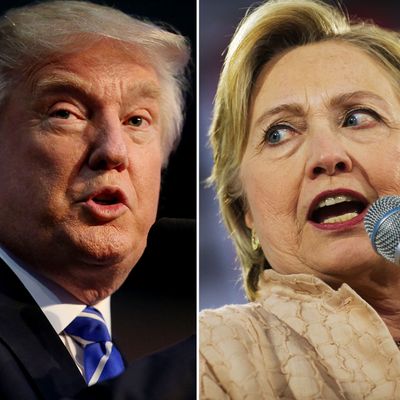
One of the sturdier memes of this presidential cycle is that most voters pretty much dislike both major-party candidates. It’s the foundation for the otherwise forlorn hopes of the Libertarian, Green, and Independent Conservative candidacies. And in the longer run, the idea that other candidates would have done much better is the whetstone on which many knives are being sharpened for a postelection bloodbath. Indeed, even the winner will not be immune; if Clinton wins, it is an ironclad certainty that Bernie fans will argue Sanders would have won by more, with broader down-ballot coattails.
So the “everybody hates Hil and the Donald” meme matters later, if not so much right now. But polling maven Mark Blumenthal, looking closely at SurveyMonkey tracking data, disputes the premise rather convincingly. Yes, these are two relatively unpopular candidates. But that’s mainly because each candidate’s supporters hate the partisan “enemy” so fiercely.
Turns out, says Blumenthal, that about a fourth of voters give both Clinton and Trump unfavorable ratings. That’s a pretty high number, but it’s not close to a majority. And then if you look at intensity levels, the universe of “plague on both your houses!” voters shrinks even more significantly: Only about 10 percent of voters dislike both candidates with an equal level of disdain.
Looking more closely at that dyspeptic group, Blumenthal finds, unsurprisingly, that they are disproportionately unconnected to either major party and, more important, less likely to vote at all. If they do vote, a majority of them presently will go Libertarian or Green. It’s a good guess that as the voting decision approaches, a goodly number will either tilt in one major-party direction or another or decide to stay home.
As one might expect from the toplines of virtually every recent poll, Clinton has a tangible if not overwhelming advantage over Trump according to the various measurements of popularity or unpopularity. Even among the “I hate them both equally” segment, she leads Trump 36-24. In the end, being a popular winning presidential candidate is a luxury: George W. Bush didn’t let it bother him in 2001 that he lost the 2000 popular vote and only became president with the assistance of the entire election machinery of the state of Florida and a majority of the U.S. Supreme Court. But the idea that a massive majority of the electorate is longing for a different choice is largely an illusion.






























